If you are going to drive in Turkey? You are in the right place. As a Turkish driver with more than 20 years of experience and a Turkish lawyer, I will tell you everything that you need to know about Driving in Turkey.
In this post, I will cover all you need to know about driving rules, Turkish drivers’ habits, toll roads, things to watch out for, and even where to find clean toilets while driving.
Driving in Turkey is easy and the most comfortable way to explore the country.
This guide will provide you with all the information about driving in Turkey, ensuring that your journey across this vibrant country is as smooth and enjoyable as possible.
Let’s start.
1. Is Driving in Turkey Easy or Hard?
Driving in Turkey is easy; the roads are in good condition, the road signals are easy to understand, and most of the time, especially on the highways, you will feel you are driving in another European country.
The traffic is not chaotic like in other Asian countries like India or Egypt. Yet, Turkish drivers sometimes drive like Need for Speed movie actors or can violate your passage rights.
Yet, the hardest thing about driving style in Turkey is other Turkish drivers.
Long story short, Turkish drivers are less predictable and have a tendency to violate rules more than the average European driver.
Yet, lately, traffic accidents are less likely to happen because of skyrocketing car prices. Turkish drivers are more careful about protecting their cars from scratches because accidents reduce the car price.
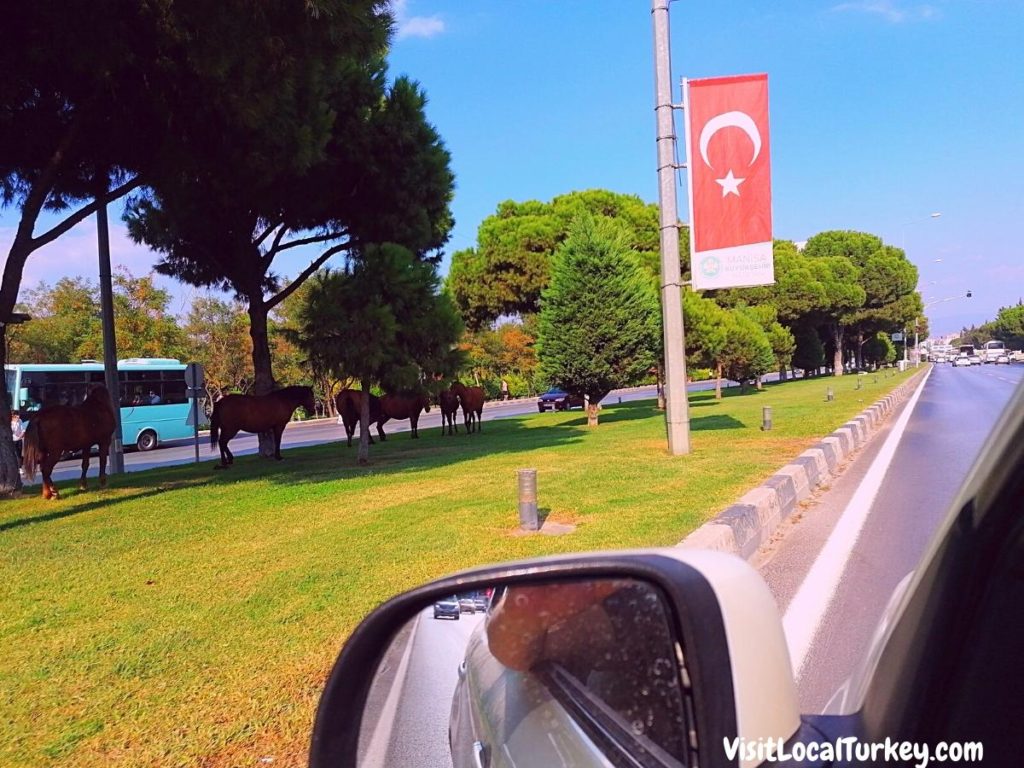
1.1 Traffic in Major Cities
In big cities (like Istanbul, Izmir, or Ankara), traffic jams are common, especially early in the morning and late afternoon when people are commuting between their work and home.
The worst place to drive in Turkey is the Istanbul metropolitan area because of traffic congestion.
Drivers in Istanbul are also more aggressive about reaching their destination. There can be too much honking, and while if you miss the turn, you have to travel miles to take that turn again.
Using taxis or public transport can be a better option within metropolitan areas, especially in Istanbul, but when traveling between cities, I nearly always travel by driving my car.
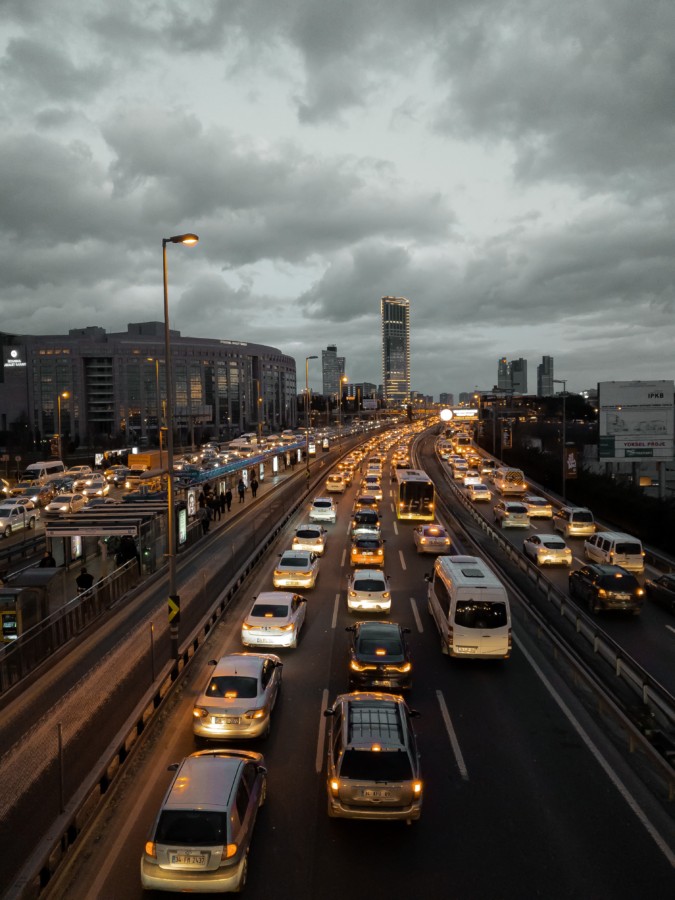
At night time, public roads have adequate lights, and it is safe to drive like the day in Turkey. I personally like driving at night, because traffic has no congestion.
In summer, it is much more comfortable to drive at night, especially when driving between cities.
1.2 Rural Areas
These days, you will have a hard time finding rural areas in Western Turkey and the Southern Coast, which most tourists visit.
These regions are developed with good road systems thanks to decades of infrastructure investments.
Even in the villages, most roads are in good condition, and you can easily travel Turkish roads with regular cars.
I do not remember a time when a road was poor or narrow, so I could not pass with my car.
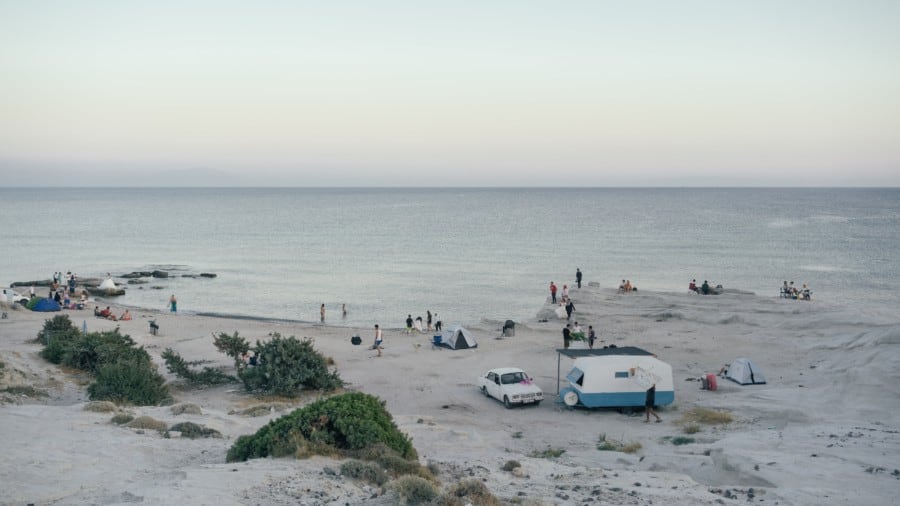
Yet, SUVs may be required if you wish to go off the less-beaten path and Eastern Turkey.
Besides some ghettos in major cities or the areas near the Syrian border, Turkey is perfectly safe to drive.

3. Can Tourists Drive or Rent a Car in Turkey?
Foreigners and tourists with foreign driving licenses can drive or rent a car in Turkey.
As a general rule, all foreign driving licenses with a photo are valid in Turkey. The only condition is that they should be written in the Latin alphabet.
With foreign driving licenses, tourists can drive in Turkey for up to 6 months after entering Turkey.

If you are staying long-term, you may think of acquiring an International Driving Permit or converting your driver’s license to a Turkish one.
All British, American, Canadian, Australian, EU, Indian, Pakistani, and UAE driving licenses are valid in Turkey if they are not provisional and the driving license contains a photo.
For more details, check out my article “Can Tourists Drive in Turkey?” or my articles for British driving licence or US driving license holders.
Additionally, the minimum age requirement for driving in Turkey is being over 18 years old. Some car rental companies may refuse to rent a car if the driver is under 21 years old.
Click to go to “How can you rent a car section?” of this article which is located further down.
🚗💨 Want to book your car rental? Click the link to book directly with Discover Cars, which searches all national and local companies to get you the best rates.
4. Is Driving in Turkey Safe?
Driving in Turkey is not the safest when compared with other European countries. Yet, Turkey is one of the safest places in the world to drive.
Turkey is riskier than Europe but the safest place in the Asia continent to drive. Also, Turkey is safer than most countries on the American continent.
Let me demonstrate my point with data.
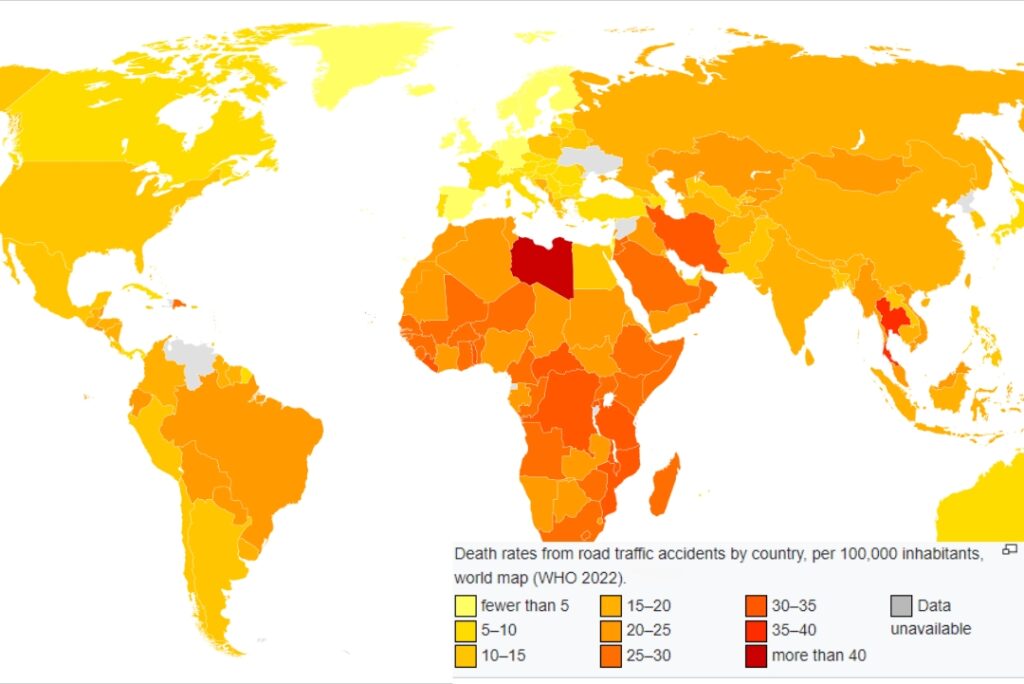
This is a graphic prepared by the World Health Organization. It shows death rates from road traffic accidents by country. (per 100,000 inhabitants)
You can see in the graphic that traffic safety in Turkey is better than the world average. Turkey is only outranked by European countries.
Turkey and the USA drive on the right-hand side of the road, which may make the transition easier for American drivers in Turkey than those from left-hand driving countries.
As someone who has experienced driving in Asia and Africa, I can also confirm that driving in Turkey is safe compared to all other Asian and African countries.
However, driving in Turkey is more energetic when compared to European or US standards.
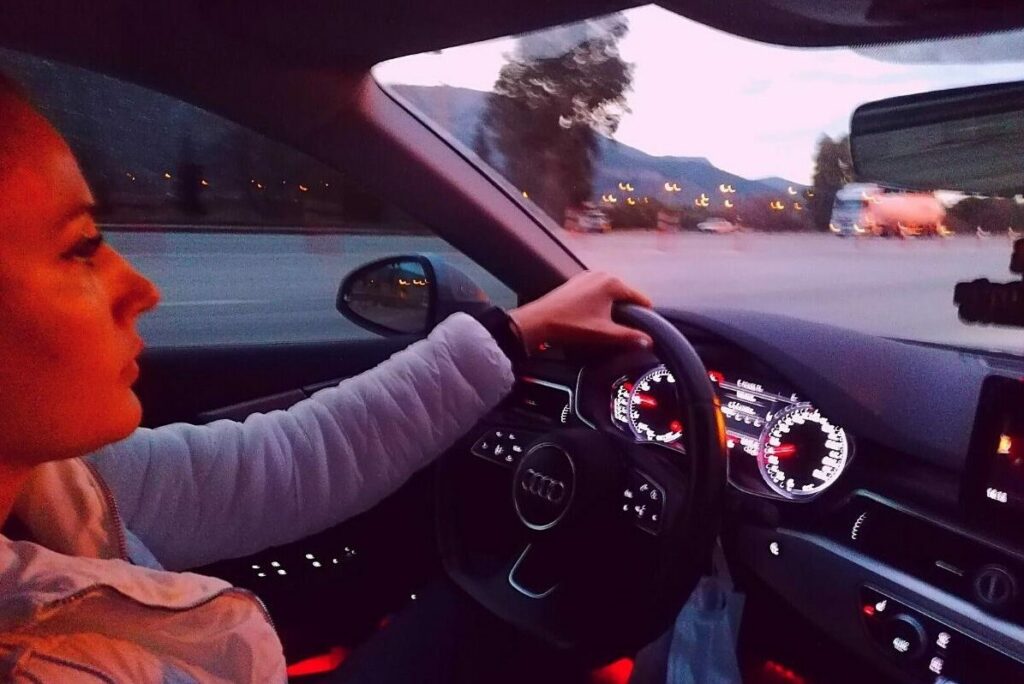
4.1 Is it Safe For Tourists or Women to Drive in Turkey?
It is safer for tourists and women to drive in Turkey because Turkish drivers are more forgiving to tourists and women.
Turkish drivers are prone to show aggression within themselves and less understanding of each other because they take it as a kind of ego war between themselves.
If you do not show aggression, a foreigner will be forgiven instantly. Don’t try to speak Turkish. Speak in your language or in English with a smile; the Turkish driver will go his merry way.
In the women driver’s case, the average driver will think there is nothing to prove by showing aggression toward a woman driver.
Sometimes they may want to flirt, but again this is rare and not approved behavior by the Turkish public.
Especially in holiday destinations, tourists are protected by local people because they are seen as an income source for their economy.
5. Driving Tips, Things to Know, Rules, and Requirements
Turkish traffic rules are within European standards, and there is no major difference. Yet, Turkish traffic has some unique behavior that can be stressful to adapt to.
Here is the ultimate list of things to know while driving in Turkey.
5.1. Turkish Drivers
Firstly, the Turkish driver’s mentality is different. I could write a separate article on the reasons for this sociological phenomenon.
Simply put, some warm-blooded Turkish drivers drive riskier compared with the average European driver.
As my father always told me, a good driver is not a driver who drives well. A good driver is a driver who can foresee other drivers’ mistakes and tolerate them.
In Turkey, drive defensively thinking that other drivers can make mistakes.
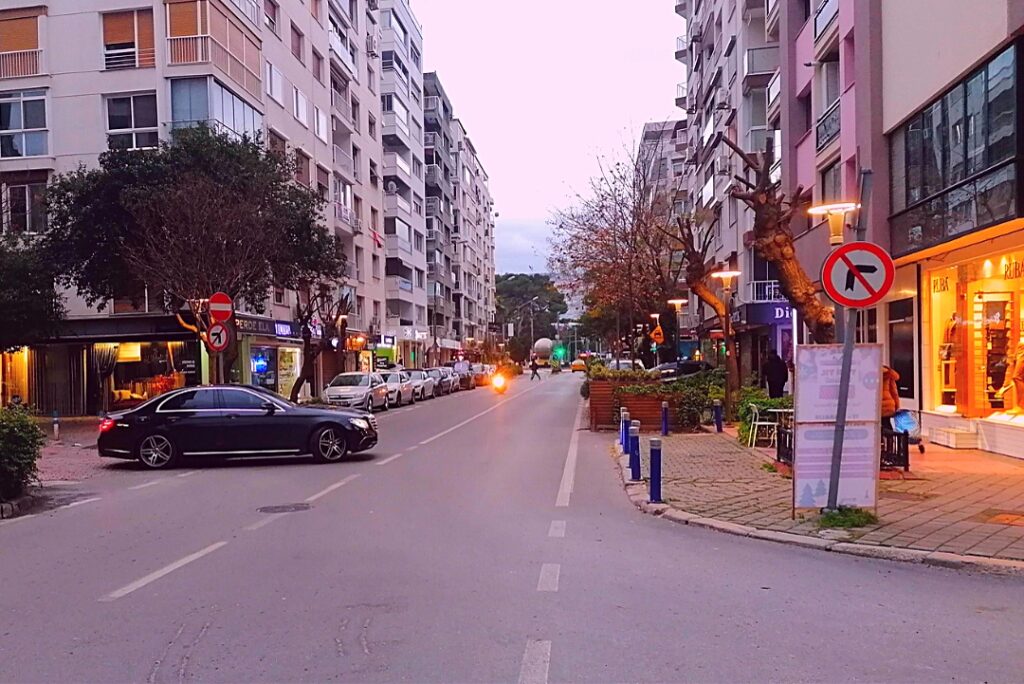
5.2 Car Honking
Car honking is not always about aggression. It is a way to alert drivers that you are getting close to their car or that the have lights turned green, and you should go.
While car honking may be rude in your country, Turkish drivers use car honking in various ways to communicate and rarely for cursing someone.
5.3 Turkish Driver Flashing Lights Behind You
One of the scariest behaviors for foreign drivers is Turkish drivers’ habit of getting close to your car’s back and flashing their lights behind you.
Nothing personal in this behavior, and there is no need to be scared.
Let me help you understand this Turkish driver’s behavior.
This translates to “I am faster than you, and give me the right of passage by moving to the slower right lane.”
I am not fond of this behavior as well, just move to the right lane and let the warm-blooded driver pass you.
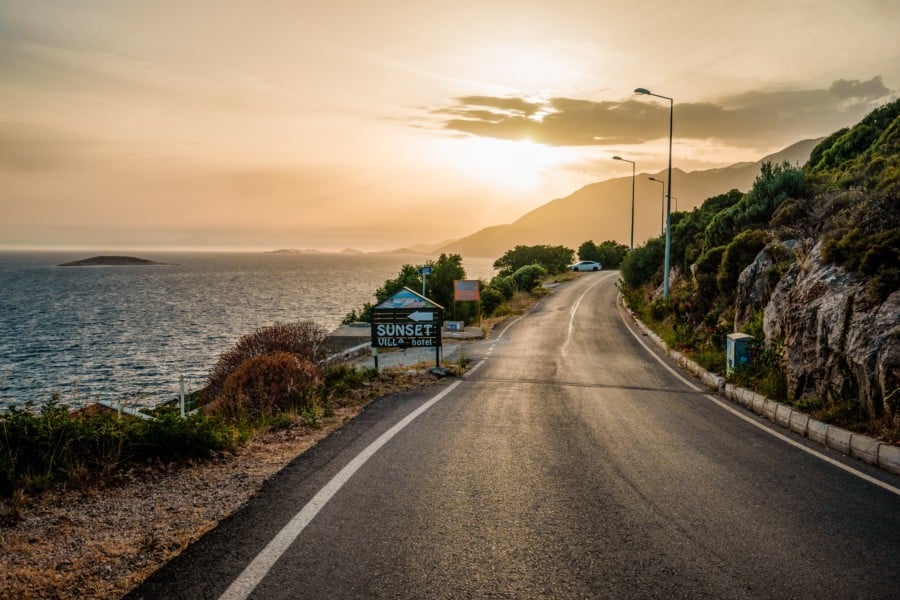
5.4. Roads Quality in Turkey and Seasons
Turkey’s network of highways, expressways, and local roads are vast and generally well-maintained and are in good condition, thanks to significant investments in infrastructure over the past few decades.
From my experience, I can tell that Turkish roads are better than most European countries.
Even in the villages, most roads are in good condition, and you can easily travel Turkish roads with regular cars.
Yet, SUVs may be required if you wish to go particularly in farming areas and off-the-beaten-path destinations and especially in Eastern parts of Turkey.
According to the World Economic Forum 2019 data, Turkish road quality is better than Italy, Greece, Australia, and South Africa.
Turkey has a higher road quality than many European countries. (Click for WEF Road Quality Index) In road quality. Turkey ranks 32nd among 141 countries worldwide.
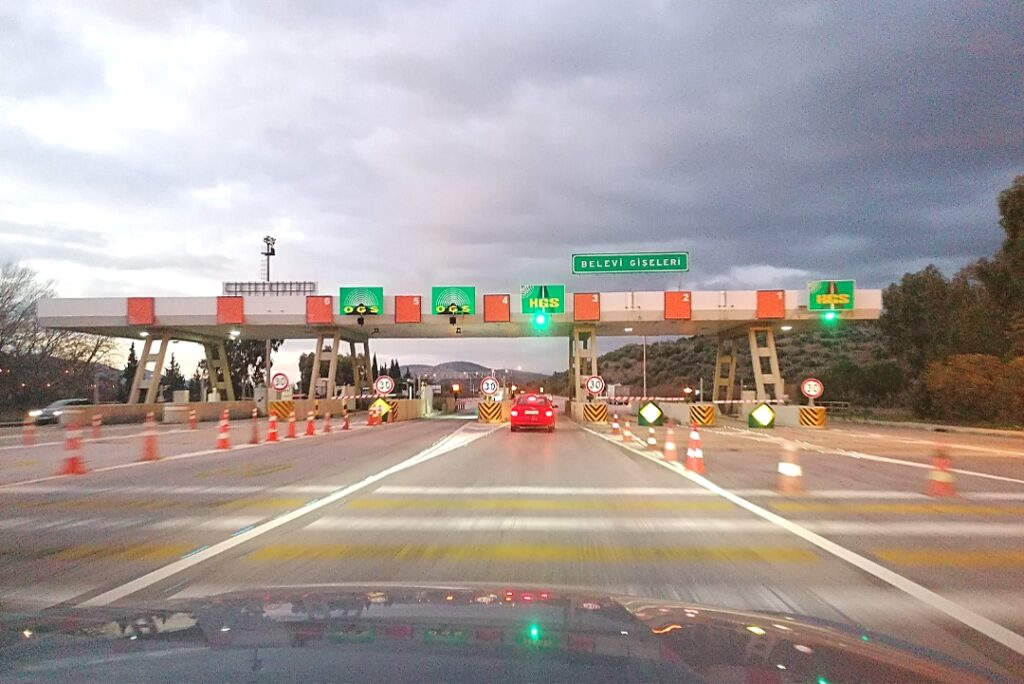
5.5. Highways and Turkish Toll System
The highways, known as ‘otoban’ or ‘otoyol,’ are toll roads providing fast and efficient travel between major cities and sometimes intercity travel in major metropolitan areas.
These roads are of high quality, with multiple lanes and strict speed limits enforced by speed cameras.
Some of the major roads and highways are not free in Turkey.
Road tolls are paid by the onboard device (OGS or HGS) in the car as you pass through. Most of the time, there is no option to pay with cash.
All rental cars are equipped with HGS or OGS, and your rental company can give more details about the policy for using this onboard device.
All highways have rest areas with fuel stations and cafes in Turkey.
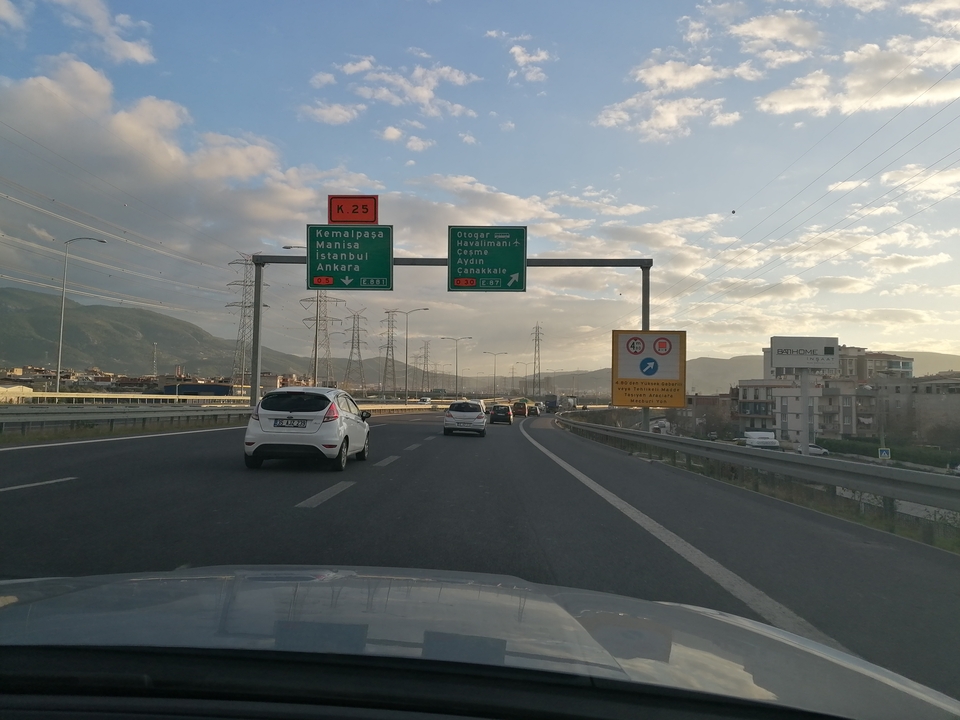
5.6 Road Signs
Road Signs in Turkey use universal symbols and have limited texts. It is easy to read the names of the places because they are written in the Latin alphabet.
Additionally, some road signs may contain English names of the places.
Just a hint, you will notice brown-colored places on road signs.
These brown-colored places in road signals indicate unique attractions. For example, the sign above shows directions to the ancient city of Priene and the beautiful village of Doganbey Village.
You should check the location from Yandex Maps or Google Maps to see how far away they are. The brown traffic signs may signal the attractions miles away or just around the corner.
Knowing the attraction’s location will help you decide if you want to explore it or not.
5.7 What Side of Road Do People Drive on in Turkey?
Turkey drives on the right side of the road like the USA and most European countries.
This is the standard. It may seem a little disorienting if you are accustomed to left-side driving like in the UK, but with a bit of practice, you should be able to acclimate.
The only exception is Northern Cyprus. In the Turkish Republic of Northern Cyprus, left-side driving is the rule of law. For more, read my article “Which Side of the Road Does Turkish Drive On?”
5.8 Turkish Speed Limits
The speed limits on Turkish roads are strictly enforced, especially in the holiday seasons and summer months.
The strangely parked cars on intercity roads with different antennas are usually police speed radars, and there are also lots of speed cameras for speed limits.
| Road Type | Speed Limit in KM | Speed Limit in Miles |
|---|---|---|
| Inside town and cities | 50 | 31 |
| Intercity Regular Roads | 90 | 55 |
| Intercity Divided Roads | 110 | 68 |
| Motorways/Highways | 120 | 74 |
5.9 Emergency Number in Turkey?
For all emergencies, you can dial 112. It is the general helpline. Besides Turkish, you can reach Arabic, English, German, Russian speaking operators.
To reach the Turkish police directly, you can dial 155 and call the gendarme (military police) by dialing 156 in rural areas.
Also you also can call your rental car company for specific instructions, roadside assistance, or other minor issues.
5.9.1 Traffic Accidents
If you are involved in an accident with a person injured, you should dial emergency lines, and police should file a report.
If nobody gets hurt, you can take pictures and file your own report with the involved parties. If the car is a rental car, consult your rental company for further details.
5.10 Best Time to Drive in Turkey
The best time to take a road trip and drive in Turkey is the summer and fall months. In winter, it can be snowy, and you may need winter tires.
Also, even in the hottest parts of Turkey, it can be cold in the winter mornings.
Especially in the very early morning, glass-like ice can form on the road. It is invisible but very slippery. Drive slowly in the winter mornings.
Check out the holiday calendar for Turkish people before your road trip plans.
During public holidays start, and end times, everyone wants to leave the city for holidays. The traffic around Metropolitan areas like Izmir and Istanbul can be chaotic.
Start your road journey earlier, a day before or at the latest 4 pm before the last workday finishes.
5.11. Alcohol Limits
Do not drive after you drink alcoholic beverages. Drinking is legal in Turkey, but driving after drinking alcohol is not legal like the rest of the world.
The alcohol limit in Turkey is the same as in most European countries and lower than in the UK and the USA.
Non-commercial drivers like tourists and regular citizens have a limit of 0.5 per mille of alcohol when driving. The Turkish police strongly enforce this limit.
The alcohol test for drivers is a breath test carried out by police officers.
If your test results are above the limit, you won’t be allowed to continue driving, your driving license will be suspended for 6 months, plus a monetary fine will be applied.
In more severe cases (like accidents), you may be subject to a blood test for alcohol.
If alcohol is found in your blood, you may face more severe consequences in such incidents.
Even if you have no fault in the occurrence of an unwanted incident, you may be deemed fully guilty. Also, you may be charged seriously, and insurance may not cover your losses.
So be safe and use taxis when you use alcohol. You can come back later to retrieve your car.
5.12 Sim Card and Online Maps
Mobile internet coverage is very good in Turkey. Also, it is tough to find a spot without access to mobile internet.
You can easily buy a sim card for your phone with data coverage when you arrive in Turkey.
This means you can use Google Maps or Yandex Maps to find your way around Turkey. These apps have pretty accurate road assistance services.
Most people use Yandex Maps in Turkey, but I like Google Maps.
Just a reminder: The driver should not use a cell phone while driving. Otherwise, you may receive a fine from traffic police. Connecting your cell phone to your car via Bluetooth and using it hands-free is okay.
5.13 Seat Belts, Baby and Children Seats
The seat belt must be worn at all times by all passengers.
Additionally, The child seat is mandatory in Turkey for babies and kids shorter than 150 cm and under 36 kg.
Fortunately, most rental car companies supply baby and child seats at your request.
5.14 Police Checks
Police checks are frequent, checkpoints are located at the exits and entrances of major settlements, and there are also random checkpoints.
If you are stopped at these checkpoints, this does not mean you did something wrong.
These are both traffic and security control points. If you have not violated any traffic rules, you will be stopped for less than a minute.
Please drive slowly and carefully when nearing these checkpoints. Follow the lead of the police officers.
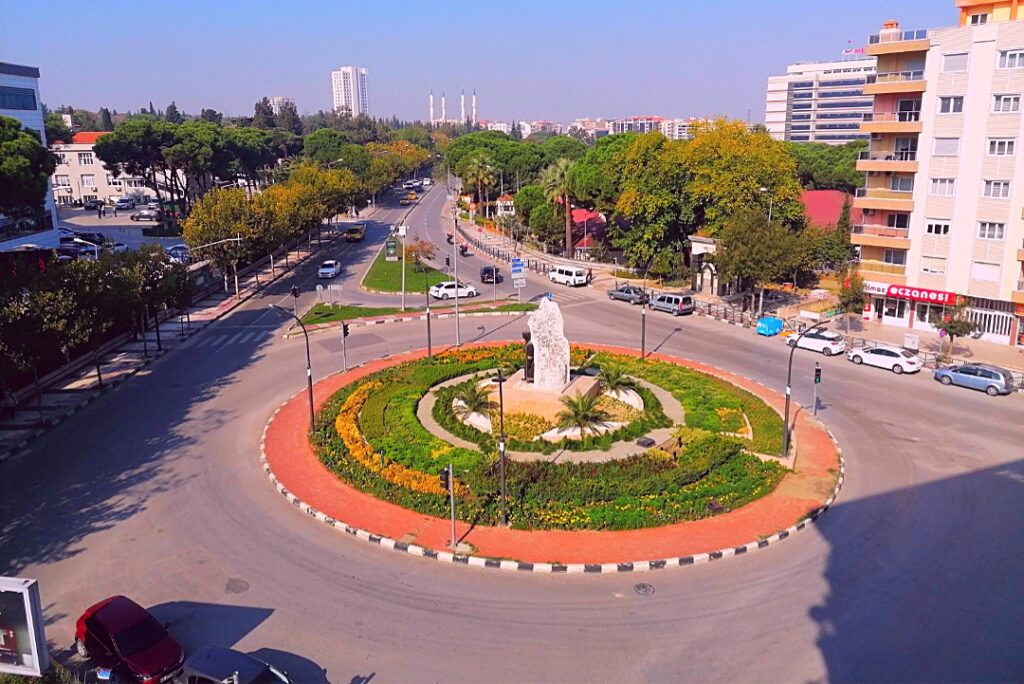
5.15 Roundabouts
This is the most confusing part of Turkish traffic.
Typically you should give priority to the traffic coming from the right. However, we do not follow this rule. Turkish people have a different understanding of this.
Turkish people tend to treat roundabouts as intersections, but our understanding may be illogical for a foreigner.
Follow the locals. Proceed carefully in roundabouts.
5.16 Pedestrians
This advice is not about driving but about walking. Never assume that the car will stop and give you the way when crossing the street. Even in the pedestrian crossings.
Be watchful when crossing the streets until you have some experience in the Turkish way.
5.17 How to park your car in Turkey?
In Turkey’s most urban areas, parking is free unless otherwise indicated in writing or forbidden by a sign. If in doubt, ask locals.
There are no parking meters in Turkey. Sometimes municipalities collect tolls from roadside parking.
Yet, parking may not be easy to find in condensed urban areas.
Luckily, most of the town has private parking lots. These parking lot operators may ask for your car keys to park your car. This is the standard practice.
TIP: If you are stuck in a metropolitan area, and do not know what to do, use the hotels’ vale services. Drive in front of a hotel, and ask for the help of the personnel.
This method may be more expensive than normal, but it is sometimes too chaotic to find a parking spot.
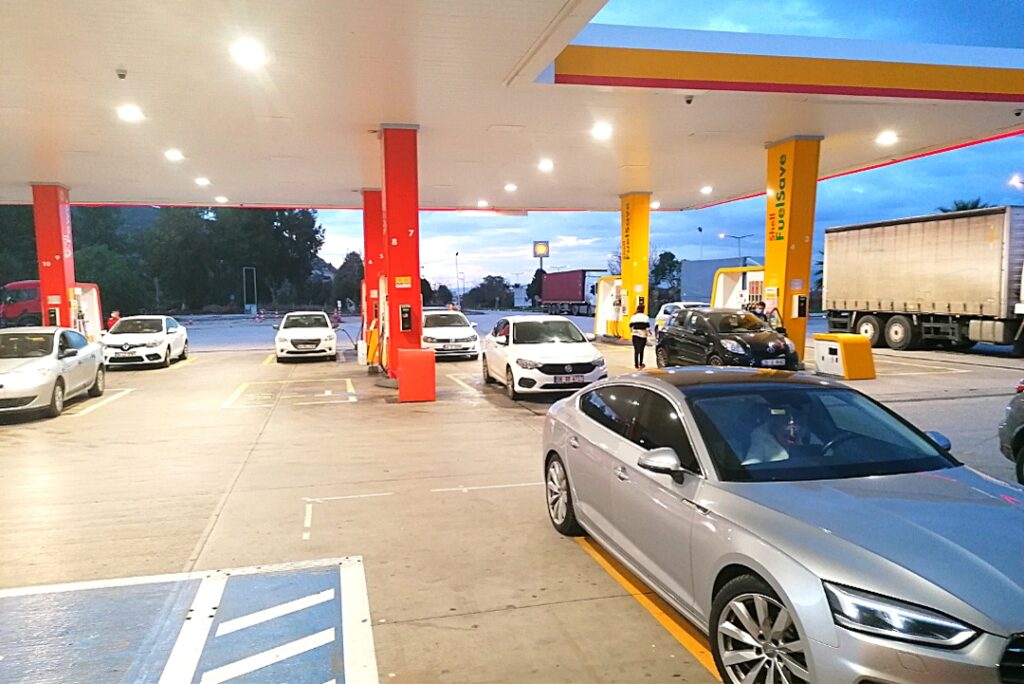
5.18 Fuel Stations in Turkey
Fuel stations are abundant in Turkey, and even on the remotest road, you can find fuel stations.
You can pay by giving cash to service members in fuel stations, or you can go inside the gas station’s market to pay with a credit card.
As standard practice, all gas stations accept credit cards.
The service level you get in gas stations differs depending on their brands. My first choice is OPET. This brand usually has the cleanest toilets and a good supermarket. The other brands I like are Shell and BP.
A windshield cleaning service is available free of charge in most gas stations. Service members usually clean your windshield after filling your vehicle’s gas tank.
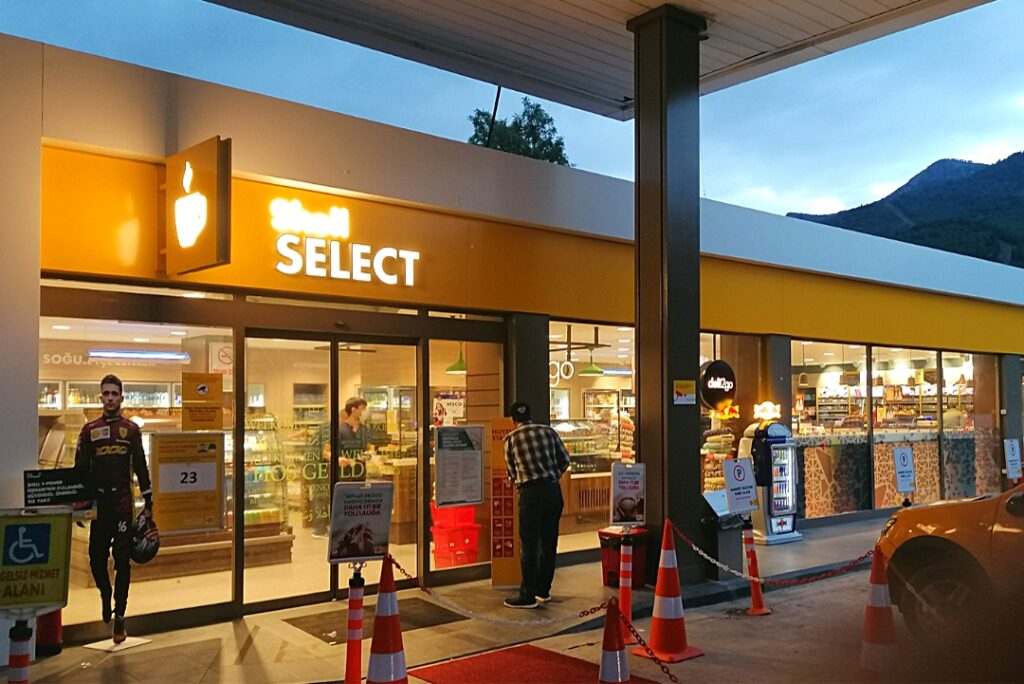
How Can You Rent a Car in Turkey?
If you’re ready to get your car rental in Turkey, my short answer is, I recommend and personally use Discover Cars. The website searches for both international and local companies, so you always get the best rates.
I also always get their full coverage insurance — which is usually less than $10 USD per day.
6.1 Where to rent a car in Turkey?
It is easy to rent a car in Turkey with a foreign driving license in Turkey. You can rent a car from Avis, Hertz, Europcar, Alamo, Budget, and many other local and international brands in Turkey.
Before renting a car in Turkey, I usually check car rental companies’ scores and reviews at Discover Cars.
Renting from local companies with low ratings in Discover Cars may not be the best idea. Unknown companies with poor reviews may result in additional charges at the end of the contract.
6.2 Two things to check when renting a car
It is common for Turkish people to use manual transmission cars. For this reason, it is standard for rental companies to provide manual transmission cars in Turkey.
If you want a car with an automatic gearbox, please double-check when renting a car.
Ask about road toll fees to your rental company.
Some of the major roads are not free in Turkey. Also, some of the road tolls are paid by the onboard device in the car. It would be best to ask about the policy of using this onboard device (OGS or HGS).
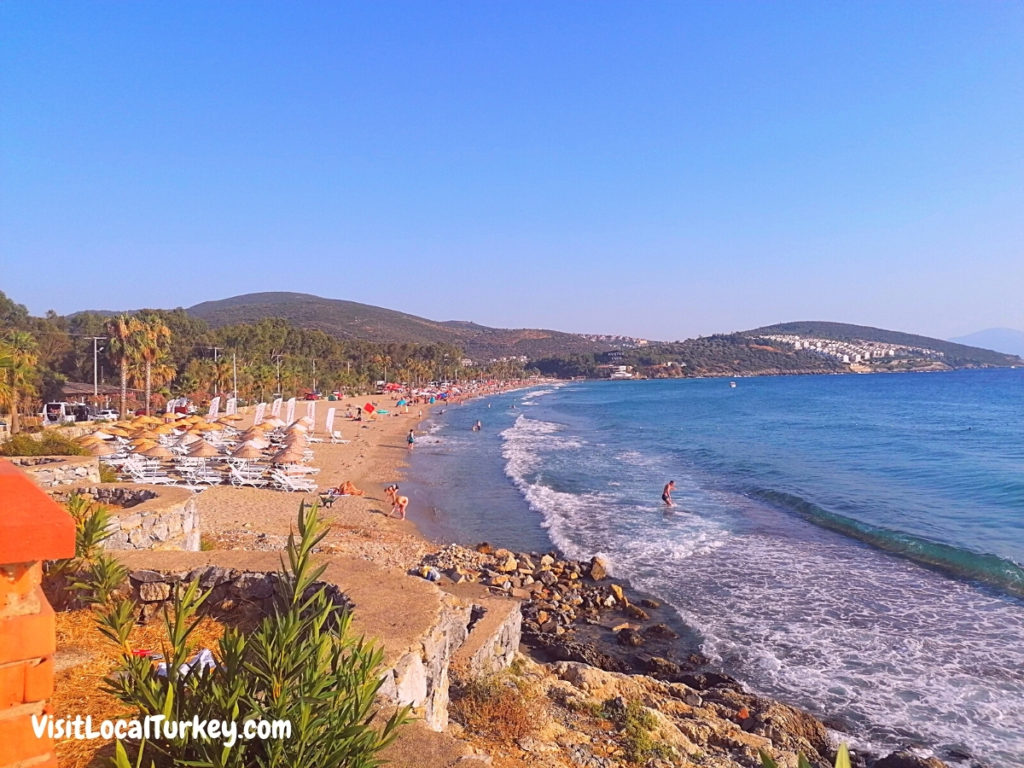
6.3 Cost of Renting a Car in Turkey
The cost of renting an economy type of car is around 15-40 Dollars per day. The rental price always excludes gasoline. Yet, the price and availability significantly differ from city to city.
6.4 What is the minimum age for renting a car in Turkey?
The minimum age for renting a car is 21. However, it is not a legal requirement. Some companies may rent a car to younger people and ask for additional payment for the risk.
6.5 Should you get the maximum possible insurance when renting a car?
All cars in Turkey are insured by mandatory traffic insurance for damages you may inflict on other people or vehicles. Yet your damages are not covered by this insurance.
For this reason, you should obtain full insurance from your rental company to cover the damages that occurred because of your negligence.
Additionally, mandatory insurance coverage limits may be low to cover all damages in severe cases. I always take full insurance. Better safe than sorry.
Click to read my article for additional renting tips in Turkey.
Turkey Travel Planning Guide
🚑 Should I buy travel insurance for Turkey?
100% YES! — With basic coverage averaging just $5-10 USD per day, enjoy peace of mind with a plan from SafetyWing, one of the biggest names in travel insurance.
💧Can you drink tap water in Turkey?
Rarely — You’ll want to buy a Water-To-Go Bottle, which filters your drinking water so you don’t get sick from drinking water in Turkey, and helps keep you hydrated while traveling Turkey. (Read more)
🚙💨 Is it safe to rent a car in Turkey?
Yes — Renting a car in Turkey is one of the best ways to explore the seven regions of Turkey! I always rent with Discover Cars, which checks both international companies and local Turkish companies, so you get the best rates. (Read more)
🏩 What’s the best way to book my Turkey accommodation?
For Turkish hotels and hostels, Booking is the best site. If you’re considering an Airbnb, don’t forget also to check VRBO, which is often cheaper than Airbnb!
✈️ What’s the best site to buy flights to Turkey? For finding cheap Turkey flights, I recommend Skyscanner and Google Flights. (Read more about the best Turkish Airline Companies.)
🎫 Do I need a visa for Turkey?
Likely Not — U.S., Canadian, and most European Passport holders don’t need a visa for Turkey but check here to see if you do need a Turkey travel visa.


